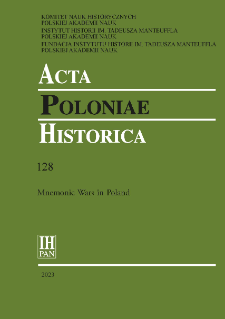
Object
Title: When the Mnemonic Actors Become Storytellers : The Lore of the ‘Recovery’ in 1970s Poland
Subtitle:
Acta Poloniae Historica T. 128 (2023), Mnemonic Wars in Poland
Institutional creator:
Polska Akademia Nauk. Komitet Nauk Historycznych
;
Polska Akademia Nauk. Instytut Historii im. Tadeusza Manteuffla
![]() ;
Fundacja Instytutu Historii im. Tadeusza Manteuffla Polskiej Akademii Nauk
;
Fundacja Instytutu Historii im. Tadeusza Manteuffla Polskiej Akademii Nauk
![]()
Contributor:
Institute of History of the Polish Academy of Sciences
Publisher:
Instytut Historii Polskiej Akademii Nauk
Place of publishing:
Description:
Abstract:
The article examines the memoirs of Polish soldiers who settled in the lands that Poland acquired after the Second World War, the so-called Recovered Territories. The author argues that these memoirs reflect different forms of conveying the stories about the ‘recovery’, i.e. the acquisition of the formerly German lands by the Polish state in 1945. Depending on the historical and political context, as well as the personal and collective experiences of the settlers, she identifies its two main forms: myth and lore. The myth involves stories that are considered authoritative and obligatory, while lore is a type of storytelling that involves stories that are considered flexible and optional by the people who tell or listen to them. She further analyses how the myth of the ‘recovery’ subsequently transformed over time into lore from the immediate post-war period up to the 1970s.
References:
Assmann Aleida, Między historią a pamięcią, ed. Magdalena Saryusz-Wolska (Warszawa, 2013).
Curp T. David, A Clean Sweep? The Politics of Ethnic Cleansing in Western Poland, 1945–1960 (Rochester–New York, 2006), vii.
Etkind Alexander, ‘Hard and Soft in Cultural Memory: Political Mourning in Russia and Germany’, Grey Room, 16 (2004), 36–59.
Grzechnik Marta, ‘Recovering’ Territories: The Use of History in the Integration of the New Polish Western Borderland after World War II’, Europe-Asia Studies, lxix, 4 (2017), 668–92.
Kersten Krystyna, ‘Osadnictwo wojskowe na Pomorzu Zachodnim’, Przegląd Zachodnio-Pomorski, 2 (1964), 29–61.
Mink Georges and Laure Neumayer (eds), History, Memory and Politics in Central and Eastern Europe: Memory Games (Basingstoke, 2013).
Service Hugo, Germans to Poles: Communism, Nationalism and Ethnic Cleansing after the Second World War (Cambridge, 2013).
Sindbæk Andersen Tea and Barbara Törnquist-Plewa, Disputed Memory: Emotions and Memory Politics in Central, Eastern and South-Eastern Europe (Berlin, 2016).
Traba Robert and Rafał Żytyniec, “Ziemie Odzyskane/utracony Heimat”, in Robert Traba and Hans Henning Hahn (eds), Wyobrażenia przeszłości. Polsko-niemieckie miejsca pamięci (Warszawa, 2017), 237–59.
Wawrzyniak Joanna, Veterans, Victims, and Memory: The Politics of the Second World War in Communist Poland, transl. Simon Lewis (Frankfurt am Main et al., 2015).
Relation:
Volume:
Start page:
End page:
Detailed Resource Type:
Format:
Resource Identifier:
oai:rcin.org.pl:240448 ; 2450-8462 ; 0001-6829 ; 10.12775/APH.2023.128.08
Source:
IH PAN, sygn. A.295/128 Podr. ; IH PAN, sygn. A.296/128 ; click here to follow the link
Language:
Rights:
Creative Commons Attribution BY-ND 4.0 license
Terms of use:
Copyright-protected material. [CC BY-ND 4.0] May be used within the scope specified in Creative Commons Attribution BY-ND 4.0 license, full text available at: ; -
Digitizing institution:
Institute of History of the Polish Academy of Sciences
Original in:
Library of the Institute of History PAS
Projects co-financed by:
Ministry of Education and Science
Access:
Object collections:
- Digital Repository of Scientific Institutes > Partners' collections > Institute of History PAS > Serials
- Digital Repository of Scientific Institutes > Partners' collections > Institute of History PAS > Institute Publications
- Digital Repository of Scientific Institutes > Partners' collections > Institute of History PAS > Institute Publications > Journals
- Digital Repository of Scientific Institutes > Partners' collections > Institute of History PAS > Institute Publications > Journals > Acta Poloniae Historica
- Digital Repository of Scientific Institutes > Literature > Journals/Articles
Last modified:
Feb 28, 2024
In our library since:
Feb 15, 2024
Number of object content downloads / hits:
38
All available object's versions:
https://rcin.org.pl./publication/276828
Show description in RDF format:
Show description in RDFa format:
Show description in OAI-PMH format:
| Edition name | Date |
|---|---|
| Ćwiek-Rogalska, Karolina, When the Mnemonic Actors Become Storytellers : The Lore of the ‘Recovery’ in 1970s Poland | Feb 28, 2024 |
Objects Similar
Szarota, Tomasz (1940– )
Kobyliński, Zbigniew Rutkowska, Grażyna (1956–2019)
Magierska, Anna (1938– )

 INSTYTUT ARCHEOLOGII I ETNOLOGII POLSKIEJ AKADEMII NAUK
INSTYTUT ARCHEOLOGII I ETNOLOGII POLSKIEJ AKADEMII NAUK
 INSTYTUT BADAŃ LITERACKICH POLSKIEJ AKADEMII NAUK
INSTYTUT BADAŃ LITERACKICH POLSKIEJ AKADEMII NAUK
 INSTYTUT BADAWCZY LEŚNICTWA
INSTYTUT BADAWCZY LEŚNICTWA
 INSTYTUT BIOLOGII DOŚWIADCZALNEJ IM. MARCELEGO NENCKIEGO POLSKIEJ AKADEMII NAUK
INSTYTUT BIOLOGII DOŚWIADCZALNEJ IM. MARCELEGO NENCKIEGO POLSKIEJ AKADEMII NAUK
 INSTYTUT BIOLOGII SSAKÓW POLSKIEJ AKADEMII NAUK
INSTYTUT BIOLOGII SSAKÓW POLSKIEJ AKADEMII NAUK
 INSTYTUT CHEMII FIZYCZNEJ PAN
INSTYTUT CHEMII FIZYCZNEJ PAN
 INSTYTUT CHEMII ORGANICZNEJ PAN
INSTYTUT CHEMII ORGANICZNEJ PAN
 INSTYTUT FILOZOFII I SOCJOLOGII PAN
INSTYTUT FILOZOFII I SOCJOLOGII PAN
 INSTYTUT GEOGRAFII I PRZESTRZENNEGO ZAGOSPODAROWANIA PAN
INSTYTUT GEOGRAFII I PRZESTRZENNEGO ZAGOSPODAROWANIA PAN
 INSTYTUT HISTORII im. TADEUSZA MANTEUFFLA POLSKIEJ AKADEMII NAUK
INSTYTUT HISTORII im. TADEUSZA MANTEUFFLA POLSKIEJ AKADEMII NAUK
 INSTYTUT JĘZYKA POLSKIEGO POLSKIEJ AKADEMII NAUK
INSTYTUT JĘZYKA POLSKIEGO POLSKIEJ AKADEMII NAUK
 INSTYTUT MATEMATYCZNY PAN
INSTYTUT MATEMATYCZNY PAN
 INSTYTUT MEDYCYNY DOŚWIADCZALNEJ I KLINICZNEJ IM.MIROSŁAWA MOSSAKOWSKIEGO POLSKIEJ AKADEMII NAUK
INSTYTUT MEDYCYNY DOŚWIADCZALNEJ I KLINICZNEJ IM.MIROSŁAWA MOSSAKOWSKIEGO POLSKIEJ AKADEMII NAUK
 INSTYTUT PODSTAWOWYCH PROBLEMÓW TECHNIKI PAN
INSTYTUT PODSTAWOWYCH PROBLEMÓW TECHNIKI PAN
 INSTYTUT SLAWISTYKI PAN
INSTYTUT SLAWISTYKI PAN
 SIEĆ BADAWCZA ŁUKASIEWICZ - INSTYTUT TECHNOLOGII MATERIAŁÓW ELEKTRONICZNYCH
SIEĆ BADAWCZA ŁUKASIEWICZ - INSTYTUT TECHNOLOGII MATERIAŁÓW ELEKTRONICZNYCH
 MUZEUM I INSTYTUT ZOOLOGII POLSKIEJ AKADEMII NAUK
MUZEUM I INSTYTUT ZOOLOGII POLSKIEJ AKADEMII NAUK
 INSTYTUT BADAŃ SYSTEMOWYCH PAN
INSTYTUT BADAŃ SYSTEMOWYCH PAN
 INSTYTUT BOTANIKI IM. WŁADYSŁAWA SZAFERA POLSKIEJ AKADEMII NAUK
INSTYTUT BOTANIKI IM. WŁADYSŁAWA SZAFERA POLSKIEJ AKADEMII NAUK


































